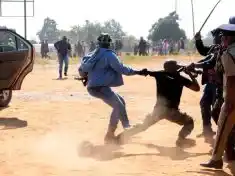
Human rights and advocacy campaigners in Malawi have called on the Malawi government to investigate and repatriate two Malawian girls working in Russia’s Alabuga Special Economic Zone (SEZ), deemed to be part of wider Russian exploitation of foreigners from developing countries.
While details or particulars of such Malawian girls are still sketchy, the Russian Investigative Outlet Protokol says they are among the 182 women from Africa and Asia, working in an enemy drone factory in Alabuga.
This revelation comes amid news that the Ukrainian attack on the Alabuga Special Economic Zone (SEZ) in Tatarstan in April 2024 showed that the area is a target for military operations.
The Russian investigative outlet Protokol—which runs anti-war stories online from the city of Samara—revealed in an exposé that the Alabuga SEZ contains a drone factory staffed by foreign recruits.
Research further shows that the Alabuga SEZ runs multiple programmes, including Alabuga Polytechnic College—which provides joint work-education programmes to 15-16-year-old male Russian students—and the Alabuga Start Programme, which offers training and work specifically to girls from Africa between the ages of 18 and 22.
Through the Alabuga Start Programme, girls in Africa (only those between 18 and 22 years) are being wooed into Russia for a variety of offers such as work and training, with attractive packages, an income which many feel is a dream come true.
However, their safety is questionable: their area of deployment is a target for the Ukrainian counter-offensive as the Russian aggression against it continues.
Calls for Malawi to act grow
Reacting to the reports, Benedicto Kondowe, who is Chair of National Advocacy Platform-NAP, a grouping of human rights and social organisations in Malawi, said there is a need for the Malawi Government to launch investigations to ensure the safety of its citizens and repatriation of the affected girls.
He further hinted that there is also a need for proper civic education for jobless Malawian youths so that they do not end up in such situations which can cost their lives.
“We implore the government to expedite investigations to rescue the girls. It is important to have them repatriated home safely,” Kondowe said.
The number of young girls recruited through the Alabuga Start Programme included Uganda (46), Kenya (14), Nigeria (14), South Sudan (14), Rwanda (14), Sri Lanka (10), Zambia (4), Ethiopia (6), Ghana (2), Malawi (2), Mozambique (1), South Africa (6), Tanzania (4), and Zimbabwe (4).
Through its social media posts, the Alabuga Start Programme has shown pictures of some successful applicants from African countries, including Rwanda, Ghana, Nigeria, Tanzania, Uganda and Kenya, who have signed up for the programme that promises work and training in various fields.
That aside, one of the lead Researchers for Human Rights Watch-HRW in the African Region, Idriss Nassah sounded that it is news worth finding out.
“Interesting and quite an important story. Unfortunately, I have no data on this,” he said.
HRW has often researched happenings in Malawi. In March 2024, the Human Rights Watch-HRW said Malawi should increase efforts to end widespread child and forced marriage, or risk worsening poverty, illiteracy, and preventable maternal deaths in the country.
Disaster in waiting?
Some of the Alabuga Start material also details how to stay safe if a building collapses, indicating that supervisors know the risks because an anti-drone unit called ‘Stalin’s Falcons’ is also present in the SEZ.
Blantyre-based child rights advocate, Masuzgo Banda, also mother of three, said in an interview that lack of parental care and career guidance to children leads to such developments, as most of the young girls and boys are left to make their own decisions.
“As a mother, I cannot allow my children to just travel to such volatile countries without my approval, even if they are given scholarships or promised work because the internet is flooded with fake job-related programmes,” Banda says.
Africa recently lost two young men – Lemekani Nyirenda of Zambia and Nemes Tarimo of Tanzania – who were studying in Russia but found themselves at the battlefront fighting in Ukraine to secure their freedom after they were arrested and jailed for alleged criminal offences.
Nyirenda and Tarimo were promised freedom from their prison terms if they successfully fought the way in Ukraine on behalf of Russia following their recruitment from prison by the leader of the mercenary group Wagner, now called the Africa Corps.
Malawi silent again on a similar concern
While the development is of grave concern to Malawians, officials from the Ministry of Foreign Affairs and International Cooperation, including Minister Nancy Tembo, are yet to respond to queries despite several reminders.
For instance, Ministry of Foreign Affairs Public Relations Officer Charles Nkhalamba confirmed receipt of the questions two weeks ago as to whether the government was aware of the Alabuga Start Programme and the risks associated with the areas where young African girls are being made to work.
However, while promising to revert, Nkhalamba has not responded despite several reminders. Secretary of Foreign Affairs said he was out of the country when reached but promised to respond.
Concerns from Banda and other human rights campaigners also come at a time when—two years ago—some Malawian ladies were trapped in hazardous work in countries such as Oman and Kuwait where they went to work as maids.
News also went viral that they were being subjected to different forms of modern-day slavery, a development that forced the Malawi Government to initiate repatriation processes of the women after investigations and discussions with authorities in those countries.
Sergey Podystnik, editor of the independent Russian outlet—which first broke the story—claimed those working at Alabuga are forced to use toxic manufacturing materials.
“Participants in an affiliated scheme at the site, the Alabuga Composite Program, have complained about inadequate protection. Other students said they developed allergic reactions to the resin used, even developing severe itching and ‘small holes’ in their cheeks,” according to Podystnik.
But Kondowe, in reaction, has insisted that youths—who want to travel abroad for a job or education— should verify such opportunities with the government to authenticate whether they are real or not.
“Let labour deals be between governments as is the case with the Israel and Malawi Labour Export Deal signed recently in Tel Aviv. In that way, it will help the government to be accountable to its citizens, when something sinister happens,” he said.
Malawi in diplomatic conflict
While the war between Ukraine and Russia continues, just this week, Kyiv has shipped 14,500 tonnes of corn to Malawi, with another 5,000 tonnes to be delivered soon.
Ukrainian President Vladimir Zelensky said the corn would help stabilize the situation and provide for the monthly needs of over 1.5 million Malawians, who are food insecure due to the El-Nino-induced weather this year.
Commissioner for the Department of Disaster Management Affairs (DODMA) Charles Kalemba appreciated the donation, saying it will help families affected by hunger
According to the Malawi Vulnerability and Assessment, 4.5 million out of the 20 million Malawians need urgent food aid because farming households in 23 of our 28 districts did not harvest due to floods and El Nino weather.
However, social commentator Mavuto Mwase thinks the maize donation gesture by Ukraine is one way of buying sympathy from Malawi, considering that two months ago, their Minister of Foreign Affairs visited Malawi, Zambia and other SADC countries.
Malawi also has diplomatic relations with Russia, something that puts Lilongwe in a tight situation when making international decisions.
This is because the Russian government 2023 donated 20,000 tons of fertilizer to Malawi as part of its efforts to garner diplomatic support from various African nations.
At the handover ceremony, Malawi’s Minister of Agriculture Sam Kawale said the fertilizer will reach 400,000 farming households and boost their agricultural production.
But in 2022, Malawi voted to censure Russia at the United Nations for its invasion of Ukraine, while more than 15 other African countries abstained from the vote.
Russian Ambassador to Malawi Nikolai Krasilnikov said in 2023 that he hoped African leaders would press for the abolition of international sanctions against Russia.






0 Comments